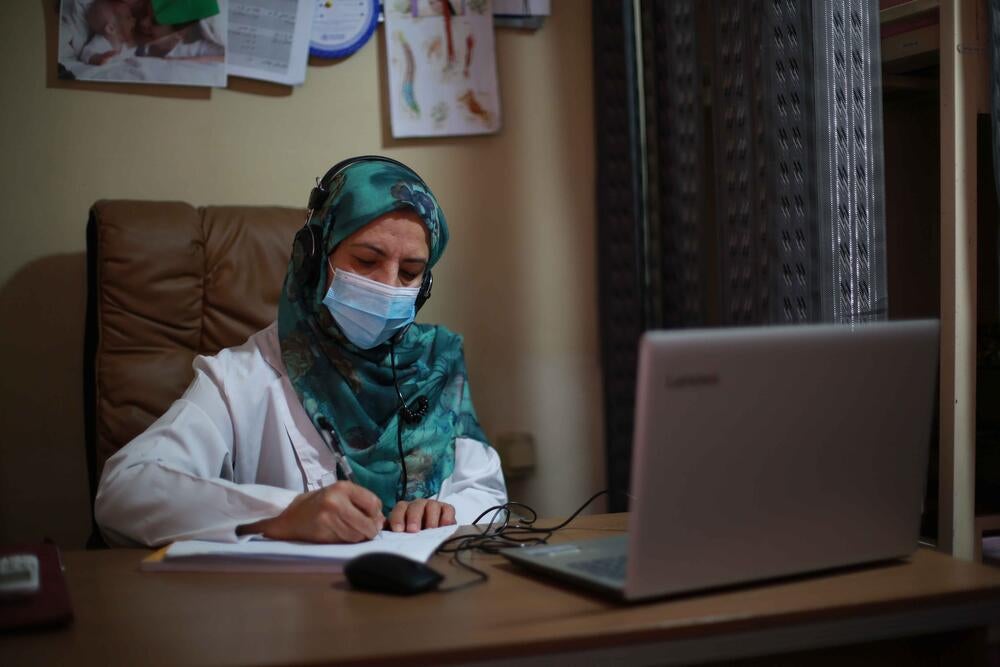News
Emergency help is a phone call away for midwives in Afghanistan
- 21 December 2021
News
Kabul, AFGHANISTAN – One evening in August, Firoza, a 34-year-old mother of five, was rushed from her village of Chesht-Sherat in Herat Province to a UNFPA-supported Family Health House. She was in labour but had developed complications and was in severe pain.
Family Health Houses help people in hard-to-reach areas to access otherwise scarce maternity services, and have supported more than 15,000 women in delivering their babies safely across Afghanistan so far in 2021. After being treated by staff at the health centre, Firoza was able to give birth safely. But her midwife, Amina, noticed there was something different about this delivery – it wasn’t over. Firoza had another baby on the way.
Family Health House guidelines advise midwives not to attempt to deliver twins alone, but Firoza’s precarious condition meant it would have been too dangerous to transfer her to another facility, and in any case most had closed due to the deteriorating security situation. Nervous for the well-being of her patient, Amina quickly picked up the phone and called the Midwifery Helpline for support.
UNFPA’s Midwifery Helpline offers remote mentoring to midwives in Afghanistan, 24 hours a day, seven days a week. Launched in 2016, the toll-free number is staffed by two gynaecologists and two midwives who provide counselling, referrals and step-by-step instructions to lead health practitioners through complex, and at times life-threatening, procedures. The line receives more than 30 calls a day, some 80 per cent of which are from midwives working at UNFPA’s 172 Family Health Houses across the country.
A call for help
Amina was guided through the next birth by helpline staff, successfully delivering Firoza’s surprise second baby. But their joy was cut short when Firoza became unwell and started bleeding profusely: she had developed a sudden and severe postpartum haemorrhage, which can be lethal if not treated rapidly.
The midwife called the helpline back, explaining Firoza’s critical condition and following advice on how to stop the haemorrhage. The new mother of twins recovered well, and was closely monitored by Amina and the helpline team before being referred to a district hospital for further specialized treatment the following morning.
“It was a difficult time for me, but I’m lucky that I was supported by the Family Health House. Now I’m feeling well and my twins are healthy,” Firoza said when she visited the facility again a week later for postnatal care.

As more and more people turn to UNFPA-supported Family Health House services for urgent maternal and newborn care, the staff themselves are also in ever greater need of support. Despite colossal challenges, midwives across Afghanistan continue to work, risking their own lives to save those of vulnerable women and girls.
Political upheaval in Afghanistan over the past few months has wrought havoc on the country’s economic and security situation, with many humanitarian operations grinding to a halt – including essential health services. While demand for medical supplies has soared, crippling shortages of medicine and equipment and severely understaffed facilities are leaving the lives of those who need the most critical care hanging in the balance.
Afghanistan’s health system brought to its knees
Heavily dependent on international support, the country's health system is now teetering on the brink of collapse. If key projects funded by donors were to be suspended, that could tip it over the edge, leaving millions of Afghans devoid of any functioning health care.
Even before the current humanitarian disaster, Afghanistan had one of the highest maternal mortality rates in the world, despite more than halving the number of women who die in childbirth every year over the past two decades thanks to major investments in the health system. Prior to the crisis, one Afghan woman was still dying from pregnancy-related complications every two hours; that number is now surely set to rise.
UNFPA in Afghanistan is battling to reach thousands of women and girls with life-saving sexual and reproductive health and protection services, not only through its Health Houses but also with more than 20 mobile health teams, four emergency clinics and some 80 psychosocial support and counselling facilities.
The country’s uncertain future has forced many of its health professionals to leave in search of safety and security. This ‘brain drain’, particularly in reproductive health services, makes support for maternal and newborn care more crucial than ever to bridge the widening gap in assistance for more than 430,000 women who are currently pregnant, of whom one in 20 is expected to face complications over the next three months.